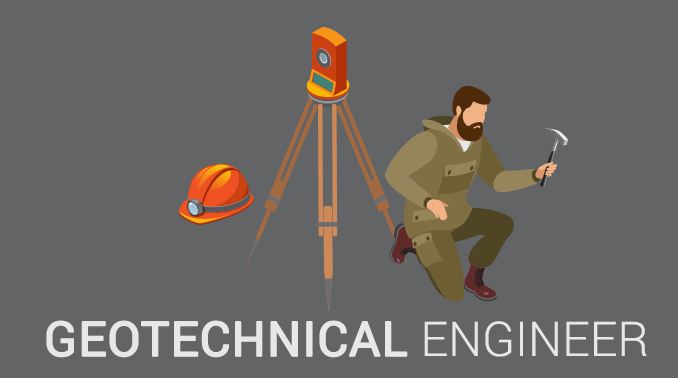Rumored Buzz on Geotheta

A geotechnical engineer is a specialized civil designer who concentrates on the habits of soil, rock, and other products discovered under the Earth's surface area. They apply scientific principles and design techniques to examine the residential or commercial properties and behavior of these products to sustain the secure and effective layout, building, and upkeep of infrastructure projects.
They carry out site investigations, accumulate samples, do research laboratory examinations, and evaluate information to review the suitability of the ground for building and construction jobs - Engineer of Record. Based on their findings, geotechnical engineers supply referrals for foundation design, slope stability, keeping structures, and reduction of geotechnical threats. They collaborate with other experts, such as designers, architectural designers, and construction teams, to make sure that geotechnical considerations are integrated into the total task design and application
By assessing the behavior and properties of soil and rock, they can identify potential geotechnical hazards such as landslides, dirt negotiation, or incline instability. Their proficiency aids stop failures or mishaps that might threaten lives and residential property. Below are some comprehensive responsibilities and responsibilities of a geotechnical engineer: Site Examination: Geotechnical engineers conduct site investigations to collect data on subsurface conditions.
They translate the information to recognize the residential properties and habits of the soil and rock, including their strength, leaks in the structure, compaction characteristics, and groundwater conditions. Geotechnical Analysis and Style: Geotechnical designers assess the information accumulated throughout website examinations to assess the stability and suitability of the site for building jobs. They carry out geotechnical computations and modeling to examine aspects such as birthing ability, negotiation, incline stability, lateral earth pressures, and groundwater circulation.
The 7-Second Trick For Geotheta
Structure Layout: Geotechnical designers play a critical duty in developing structures that can safely sustain the designated structure. They assess the dirt problems and lots needs to establish the appropriate structure type, such as shallow structures (e.g., grounds), deep structures (e.g (https://es.quora.com/profile/Ian-Hammond)., heaps), or specialized strategies like soil renovation. They consider factors such as negotiation restrictions, birthing ability, and soil-structure interaction to create optimum foundation designs
They evaluate building strategies, screen website activities, and conduct area examinations to validate that the style suggestions are followed. If unpredicted geotechnical problems develop, they evaluate the situation and provide recommendations for removal or modifications to the design. Risk Assessment and Reduction: Geotechnical engineers assess geotechnical threats and dangers connected with the job website, such as landslides, liquefaction, or dirt erosion.

Collaboration and Interaction: Geotechnical engineers function closely with various other experts involved in a task, such as designers, architectural engineers, and construction groups. Efficient communication and cooperation are important to incorporate geotechnical factors to consider into the total job design and building and construction process. Geotechnical engineers supply technical know-how, answer inquiries, and ensure that geotechnical demands are met.
Getting My Geotheta To Work
Below are some kinds of geotechnical designers: Foundation Engineer: Foundation designers specialize in developing and assessing foundations for structures. They evaluate the dirt conditions, lots needs, and site attributes to figure out the most suitable foundation type and design, such as shallow structures, deep structures, or specialized techniques like stack structures.
They evaluate the elements affecting slope security, such as soil residential properties, groundwater problems, and incline geometry, and create strategies to avoid incline failures and reduce dangers. Quake Designer: Earthquake engineers specialize in evaluating and making frameworks to withstand seismic forces. They evaluate the seismic hazard of a website, examine soil liquefaction possibility, and establish seismic layout requirements to make sure the security and durability of structures during quakes.
They perform field screening, gather examples, and examine the accumulated information to identify the dirt homes, geologic formations, and groundwater conditions at a website. Geotechnical Instrumentation Engineer: Geotechnical instrumentation designers focus on surveillance and determining the actions of soil, rock, and structures. They install and keep instrumentation systems that check factors such as dirt settlement, groundwater degrees, slope activities, and architectural variations to evaluate efficiency and give very early warnings of possible issues.
The smart Trick of Geotheta That Nobody is Discussing
They often tend to be investigative people, which implies they're intellectual, introspective, and analytical. They are interested, methodical, rational, analytical, and sensible. Some of them are additionally social, meaning they're kind, charitable, participating, individual, caring, helpful, empathetic, skillful, and friendly - Tailings Engineer.
In the workplace setting, geotechnical engineers utilize specialized software application devices to execute computations, produce layouts, and examine information. They prepare records, review job requirements, interact with customers and staff member, and coordinate project activities. The workplace setting offers a conducive atmosphere for research, analysis, and partnership with various other professionals associated with the project.
The Only Guide to Geotheta
They often go to project websites to perform website investigations, analyze geotechnical problems, and collect data for evaluation. These brows through include taking a trip to various areas, often in remote or challenging surfaces. Geotechnical engineers may carry out dirt sampling, conduct examinations, and screen building activities to make sure that the geotechnical elements of the project are being carried out appropriately.
Geotechnical engineers also work in specialized geotechnical labs. In these facilities, they perform experiments, carry out tests on soil and rock examples, and assess the engineering homes of the materials. Geotechnical lab designers work extensively in these atmospheres, taking care of screening tools, operating instruments, and taping information. They team up with other research laboratory team to guarantee exact and reliable testing outcomes.
Comments on “A Biased View of Geotheta”